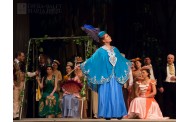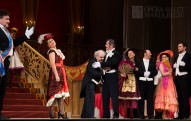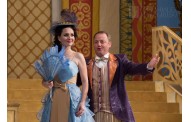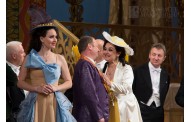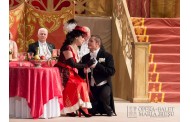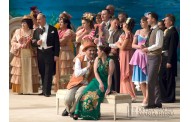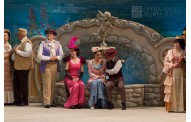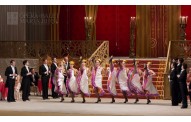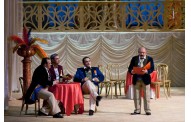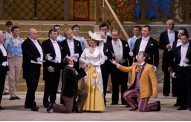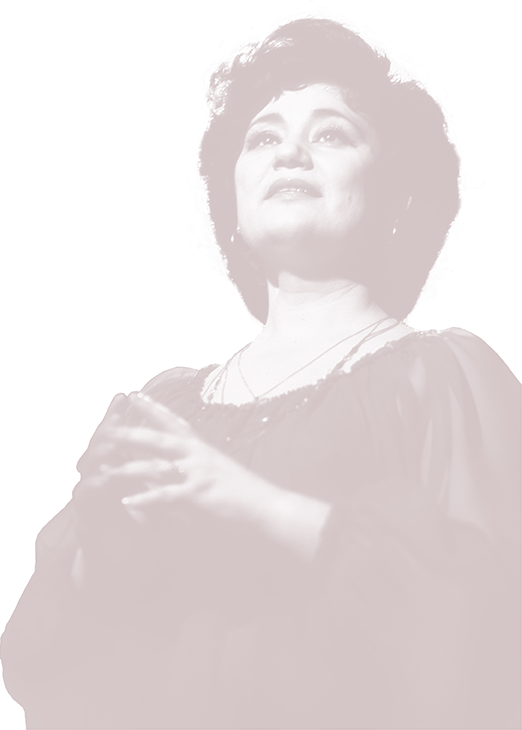
ACT I
The elite of the “pontevedrian” society from Paris participates to a ball organized aiming to celebrate the Duke’s birthday. Hanna Glawari, who has inherited twenty million francs from her late husband, is to be a guest at the ball and the ambassador, Baron Zeta, wants to ensure that she will marry another Pontevedrian and keep her fortune in the country, so that Pontevedro would be saved from bankruptcy.
Baron Zeta has in mind Count Danilo Danilovitsch, the First Secretary of the embassy, but his plans are not going well. Hannah already arrived and she is surrounded by fans eager to ask her in marriage. Danilo is not at the party, so Zeta sends Njegus, the embassy secretary, to fetch him from Maxim's.
Meanwhile, Baron Zeta's wife Valencienne has been flirting with the French attaché to the embassy, Count Camille de Rosillon, who writes "I love you" on her fan. Latter the fan was lost.
Danilo finally arrives and meets Hanna. It emerges that they were in love before her marriage, but his uncle interrupted their romance because Hanna had absolutely nothing to her name. Although they still love each other, Danilo refuses to court Hanna because of her fortune and Hanna vows she will not marry him until he says "I love you".
ACT II
A party is held in the garden at Hanna's house, to celebrate the birthday of the Grand Duke in Pontevedrian fashion, everybody being dressed up in Pontevedrian clothing. Hanna entertains by singing an old Pontevedrian song, the famous "Vilja Song".
Meanwhile, the troublesome fan continues its journey. Danilo recognizes the writing of Camille and think that it is addressed to Hanna. Hanna sees the fan, and thinks the message on it is Danilo's declaration of love for her, which he denies. Danilo's inquiries about the identity of the owner of the fan result in revelations of the details of the infidelities of some of the wives of Embassy personnel, but do not reveal the identity of the owner of the fan.
That evening, Camille and Valencienne meet in the garden. Valencienne continues to resist Camille's advances, declaring that they must part. Camille persuades Valencienne to enter the same pavilion in which Danilo, the Baron and Njegus had arranged to meet with him, so that they can say their goodbyes in private. Njegus, who arrives first for the meeting, discovers that Camille is in the pavilion with Valencienne. Njegus locks the door to the pavilion when Danilo and Baron Zeta arrive, and delays their entry to the pavilion. The Baron peeps through the keyhole, and is upset when he recognizes his own wife. Njegus arranges with Hanna to change places with Valencienne. Camille leaves the pavilion followed by Hanna, confounding the Baron when they appear. Hanna announces that she is to marry Camille, leaving the Baron distraught at the thought of losing the Pontevedrian millions. Danilo is furious and tells the story of a Princess who cheated on her Prince and then storms off to seek the distractions at Maxim's. Hanna realizes that his anger at the announcement of her engagement shows that Danilo loves her and rejoices among the general despair.
ACT III
We are invited in the cheerful atmosphere of the cabaret "Maxim", where, in turn, appear all the characters of the story that combines the game with the fan and the hunting of heritage. When Danilo arrives, having found the real Maxim's empty, he tells Hanna to give up Camille for the sake of the country. Much to Danilo's delight, Hanna tells him that she was never engaged to Camille, but that she was protecting the reputation of a married woman. Danilo is ready to declare his love for Hanna, and is on the point of doing so but when he remembers her money, he stops himself. When Njegus produces the fan, which he had picked up earlier, Baron Zeta suddenly remembers that the fan belongs to Valencienne. Baron Zeta swears to divorce his wife and marry the widow himself, but Hanna tells him that she loses her fortune if she remarries. Hearing this, Danilo confesses his love for her and asks Hanna to marry him, and Hanna triumphantly points out that she will lose her fortune only because it will become the property of her husband. Valencienne produces the fan and assures Baron Zeta of her fidelity by reading out what she had replied to Camille's declaration: 'I'm a respectable wife'; and all ends happily.
Original name: Die Lustige Witwe
Libretto: Victor LÉON and Leo STEIN
After the comedy L'Attaché d'ambassade (1861) by Henry Meilhac
Directed by: Mihai Timofti, Master in Art
Assistant director: Eugen Timofti
Scenography and costumes: Ludmila Furdui
Costume assistant: Stela Furdui
Choreography: Dumitru Tanmoșan
World premiere: December 30, 1905, "Theater an der Wien", Vienna
Premiere in Chisinau: November 30, 2012, at the National Opera and Ballet Theater "Maria Biesu"
Duration of the show: 2 hours 30 minutes (two breaks)
The opera is presented in Russian

